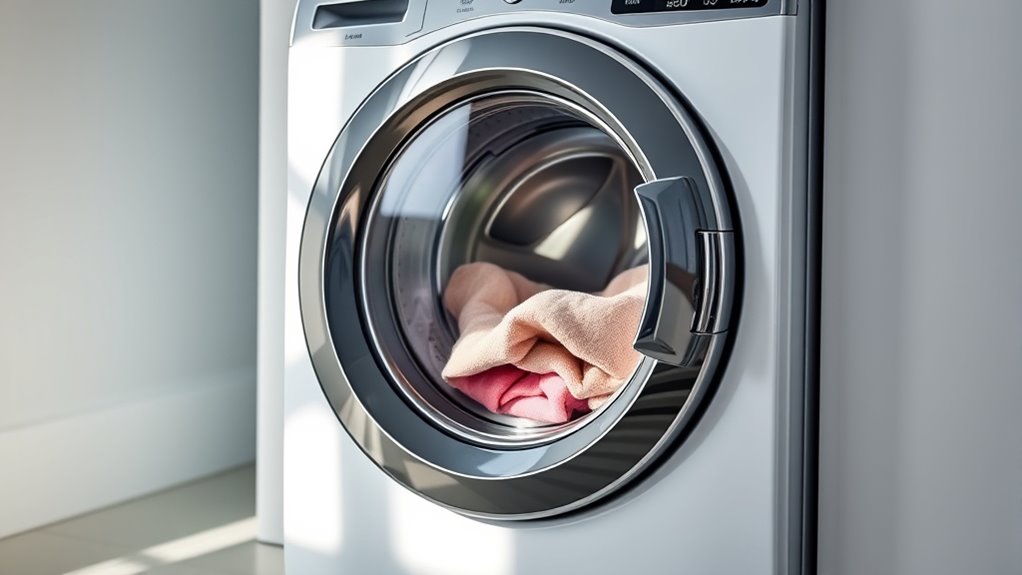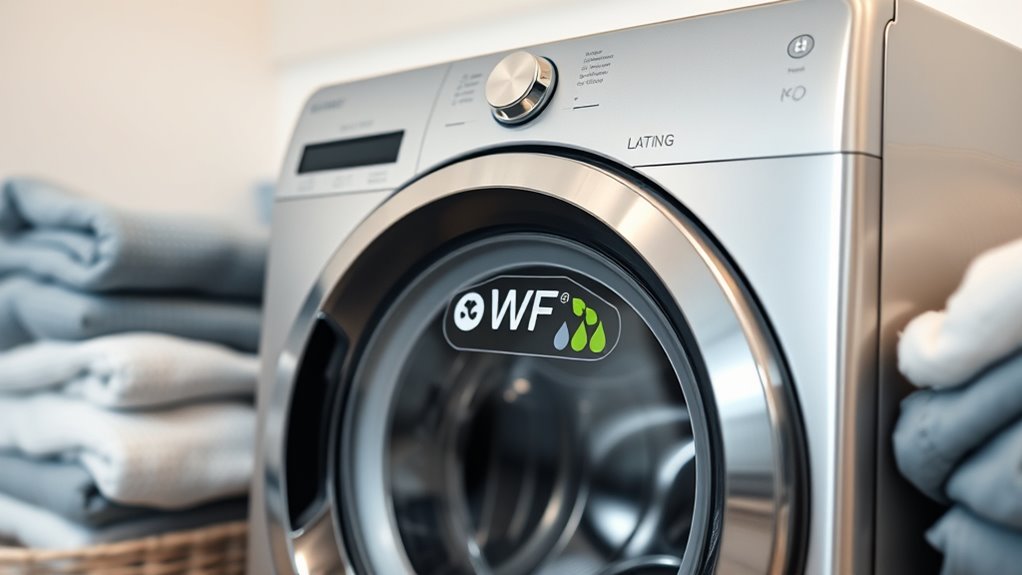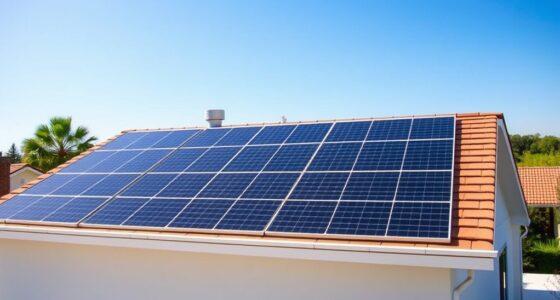Understanding IWF ratings helps you gauge a washer’s water efficiency, with lower scores indicating higher water savings. This improves your utility bills, reduces water consumption, and supports eco-friendly practices. Features like eco cycles and load size controls further optimize water use without sacrificing cleaning power. Knowing how IWF ratings work allows you to choose the most efficient washer for your needs. Keep exploring to uncover more tips on maximizing your washer’s performance and efficiency.
Key Takeaways
- IWF rating measures washer water efficiency; lower ratings indicate higher water-saving performance.
- Eco-friendly cycles are designed to use less water while maintaining cleaning effectiveness.
- Load size sensors help washers optimize water use, preventing overuse on smaller or lightly soiled loads.
- High IWF ratings support water conservation, cost savings, and environmentally sustainable laundry practices.
- Understanding IWF ratings guides consumers in choosing efficient washers that reduce water and energy consumption.

Ever wondered how you can save water while still getting your clothes clean? One of the best ways is by choosing a clothes washer with a high IWF rating—meaning it’s designed to use less water per cycle. The IWF, or Integrated Water Factor, measures how efficiently a washer uses water, with lower numbers indicating greater efficiency. When you pick an appliance with a good IWF rating, you not only reduce your water bills but also contribute to conserving a essential resource. Additionally, many efficient washers are engineered to optimize detergent savings, meaning you don’t need to use as much soap to get your clothes truly clean. This benefits your wallet and lessens the environmental impact of your laundry routine.
Modern washers with high IWF ratings often come equipped with eco friendly cycles. These cycles are designed specifically to minimize water use while maintaining cleaning power. When you select an eco friendly cycle, the machine adjusts water levels and agitation patterns to use only what’s necessary for effective cleaning. This is especially advantageous if you’re trying to reduce water consumption or live in areas with limited water supply. furthermore, eco friendly cycles are often paired with energy-saving features, ensuring that you’re not just saving water but also reducing the energy needed to heat water or run the motor. By combining a high IWF rating with eco friendly cycles, you make your laundry routine more sustainable without sacrificing performance.
Eco-friendly cycles with high IWF ratings minimize water use while maintaining cleaning power and energy efficiency.
Another benefit of choosing a washer with a good IWF rating is the flexibility it provides. Many models come with options that allow you to customize water levels depending on load size, which prevents overuse of water for smaller loads. This means you can wash a few items without draining unnecessary amounts of water, further enhancing your water efficiency. Plus, some washers feature sensors that automatically detect load size and adjust water levels accordingly, ensuring you’re never wasting water or detergent. This precise control not only boosts detergent savings but also helps your clothes come out thoroughly cleaned, even on smaller or lightly soiled loads.
Understanding the contrast ratio of a washer can also influence your decision, as it impacts the perceived sharpness and clarity of the images or visual cues during use. In the context of water efficiency, higher contrast ratios in display interfaces can make it easier to read settings and cycle information, reducing the chances of misconfiguration and unnecessary re-washing.
In the end, understanding the significance of IWF ratings helps you make smarter choices when purchasing a washer. By opting for models with low IWF scores, you’re investing in a machine that’s designed to use water more efficiently, especially when paired with eco friendly cycles. This synergy reduces your overall water footprint, cuts down on utility costs, and supports a more sustainable way of doing laundry. With these features, you get clean clothes, save money, and help protect the environment—all at the same time.
Frequently Asked Questions
How Is IWF Measured During Washer Testing?
During washer testing, IWF is measured by conducting water testing according to efficiency standards. You load the machine with a standard amount of laundry, run a cycle, and carefully record the total water used. This process guarantees the washer meets the specified water efficiency standards. The IWF rating reflects the water conservation level, helping you compare models and choose appliances that use less water while maintaining performance.
Do Higher IWF Ratings Mean More Water Savings?
Higher IWF ratings don’t necessarily mean more water savings. In fact, washers with lower IWF ratings use less water, supporting water conservation efforts. These eco-friendly features help you reduce your environmental impact while still cleaning effectively. An interesting stat: the most water-efficient washers can save up to 50% water compared to older models. So, look for lower IWF ratings to maximize water savings and contribute to eco-friendly living.
What Affects a Washer’s IWF Over Time?
Your washer’s IWF can change over time due to increased energy consumption and load size. If you regularly wash heavy or bulky loads, it may use more water, lowering efficiency. Additionally, energy-hungry motors or worn-out parts can cause higher water use. To maintain ideal IWF, keep your washer well-maintained, avoid overloading, and use appropriate cycle settings for different load sizes.
Are IWF Ratings Consistent Across Different Brands?
You might think IWF ratings are consistent across brands, but they often vary due to regional standards and manufacturer testing methods. When you compare brands, you’ll notice differences in ratings that reflect local regulations and design choices. Visualize this as comparing apples and oranges—similar but not identical. So, always check the specific IWF ratings and regional standards to make informed decisions, rather than assuming uniform efficiency across all brands.
Can I Improve My Washer’s Water Efficiency Manually?
Yes, you can improve your washer’s water efficiency with manual adjustments and regular washer maintenance. Start by using the appropriate load size for each wash, avoiding overloading. Check and clean the filters and hoses regularly to prevent clogs. Select eco-friendly cycle options if available, and guarantee the water level matches your load. These simple steps help optimize water use and keep your washer running efficiently.
Conclusion
Think of IWF ratings as a lighthouse guiding you through the stormy seas of water waste. By understanding these ratings, you steer your laundry choices toward calmer waters, saving both water and money. Choosing an efficient clothes washer is like planting a sturdy tree that grows stronger with each use, benefiting the environment and your wallet. Make smart decisions, and let water efficiency be your compass on this journey to greener, cleaner laundry days.









